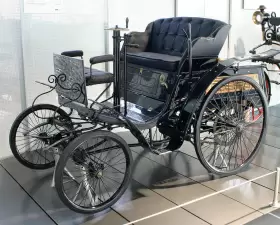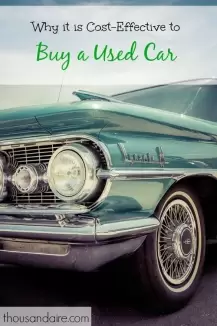People are capable of coming up with all kinds of excuses to go ahead and do whatever they wanted to do in the first place. This is especially true in situations where there are a large and financially motivated contingent of folks trying to help you justify nonsense to yourself. Car dealerships come up with all kinds of chicanery to convince you that you’ve gotten the deal of the century. The reality is, that on a per mile basis you will pay less driving a used car than a new car. Despite the preponderance of $1,000 used cars floating around folks twist themselves in knots trying to explain why taking a 50% depreciation hit on day one with a $20,000 car is financially sensible (spoiler alert: It’s not).

How big a deal is $19,000?
Digging yourself out of that depreciation hole takes a long time. You may be inclined to make the argument that better mileage, or less maintenance makes up for it. That very well could be the case, but the fact of the matter is that I expect to earn an annual 8 to 10% return on that $19,000 I don’t spend. That means that I can spend $1,520 extra on gas and maintenance before we even talk about you catching up. Can you grasp how huge the difference is? I can buy a new $1,000 car every single year, and still save more money than someone buying that $20,000 new car. A brand new Honda accord gets 27 mpg in the city, a 1996 Honda Accord gets 26 mpg in the city. You aren’t going to beat me to the tune of $520 per year on gas with that amount of difference. If some serious maintenance is required you just sell it for scrap and buy another.
Other costs
Ultimately a car, what is the cost of comprehensive insurance on our $1,000 used car? The correct answer to that, is $0. If the car gets dinged up, you probably shouldn’t care, it’s a 20 year old car, get over it. If you crash the car, don’t worry about it. You just go buy another one, out of the thousands and thousands of dollars you’ve saved. Cost of comprehensive car insurance on a new car? It’s somewhat difficult to find. The best estimate I could find was at minimum $30 per month, or an additional $360 per year. If anyone with a new car pays less, I’d be very interested to know more about it. This kicks our annual differential up to $1,880 per year. For gas, we can get an order of magnitude by figuring an extra 20% spend on gas (far more than our Honda example above), I spend about $75 per month on gas. Therefore, you’re looking at about an extra $15 per month, and that makes our differential an even $1,700.
Not a need
My pet peeve here is that people claim that their car is a need. You need transportation (debatable), you don’t need to spend $20,000 on it. Maybe you aren’t going to spend $20,000 on your new car, after all the average amount a person in the US spends on a new vehicle is…

I just looked up the average amount that American’s spend on a new car. Holy crap! You people have gone insane. Apparently, the actual price folk actually pay is $33,500. It’s easy to see that this could really drive wealth inequality. If I drive a cheap car for two decades and you drive a $33,000 car for two decades, our savings is simply going to diverge. So the purely financial conclusion is buy used. Now to be fair, I’m certainly guilty of this too. The car I drive is worth $4,000, which is far more than what I really need. Yes, you’re car will be ugly. Maybe it’s important to you that you drive a nice or comfortable car. Like every other luxury, you pay for that.Don’t go around telling yourself you need a new car, that’s a load. The financial difference is massive. If you’re a Thousandaire please, don’t keep 50% of your net worth in depreciating asset, you’ll make Franklin cry.
Adam Woods is a physicist. His research interests include building software to run and build geomagnetic models. Adam got interested in personal finance in the great recession when it became obvious an interest was necessary.
After harassing his friends and family (and a short intervention) he took to the web where he blogs about finance, investment, politics, and economics.
Adam is currently located in Boulder, Colorado where he can generally be found hiking, biking, or running a D&D campaign. He can also be contacted at adamwoods137@gmail.com.



My husband likes well-used cars (like his ’86 Bronco) because it’s easier to do the maintenance himself on them. Of course, he also feels pretty confident that if his 40 year old car breaks down, he can get it running. Me, I’d be stuck. On the other hand, I think his Bronco is so old it’s now begun to appreciate in value.
If you have the time, talent, and interest this is the dream transportation situation. You can buy old cars that don’t work so well, fix ’em, drive ’em around and resell ’em. Doing this right can make your cost of transportation negative.
There is opportunity cost to consider, but if you* have credit card debt it’s probably worth learning the new skill.
* not you Emily, but the rhetorical you; it looks like you guys have it dialed in
Where did you find a $1k car that runs??? I was lucky to find one for about 8 times that, and kind of wish I had spent an extra grand to get a base model new car. Because the $1k difference would have been made up for in maintenance. I don’t view cars as investments or assets, but as a way to get me from point a to b so I can make money and get my kids to the doctors. Everything is situational, and I’m guessing regional, too.
I had no idea you could get a new car for 9K, that’s pretty cool. Car prices *are* very regional. That being said, my rule of thumb is that if you haven’t googled your problem you haven’t tried to fix it.
When looking at your finances you have to view *everything* financially. That’s not the same as saying that money/cost is the only thing that matters. It *is* the only thing that matters to your finances.
There is a lot of space between that $1000 beater and a new $30,000 car. Right now our family cars are a 1998 Mercury Marquis, a 2001 Mercury Marquis and a 2008 Honda Accord (with 40,000 miles on it). My dad bought the 98 when it was a couple of years old, and he gave it to us in 2008, when it started giving him trouble periodically. He didn’t need that big car and didn’t want to fool with repairs, and could afford a new car. I’m not sure whether he carried comprehensive/collision insurance or not. He replaced it with the Honda, which I got when he died. Those old Mercuries are fine for my family; we have spare cars, we don’t drive far and we are almost always close to a repair show (live in suburbia). We pay our share in repair bills, but you can buy a lot of repairs for the price of a car payment. At this point we only carry comp/coll on the Honda, which is another savings. On the other hand, if I lived (or frequently went to ) the middle of nowhere, I think I’d want a new car than those old Mercuries. They haven’t left us stranded yet though.
“There is a lot of space between that $1000 beater and a new $30,000 car.”
THIS! Very true! No reason that the optimized solution is the $1000 car, the only thing I’m certain of is that the $1,000 one is better than the $30,000 one.
Another important bit you bring up is that you don’t drive far. However you slice it the biggest variable in what a car will cost you is how much you drive. It’s important not to get so distracted by the rest of this stuff that you don’t act like how far you drive is out of your control.
Great points!
I’ve actually read several studies that if you’re the type to buy a new car and drive it into the ground for 20 15 years – the cost difference between new and used is probably a wash. BUT I totally agree that buying new is a want, not a need, and it should only be done if you can afford it financially. I think a good rule of thumb is that if you can pay for it in cash, get whatever the heck you want, if you have to finance it, you’re making a bad choice.
Hi Mel. I love studies, so if you can dig up some links we’d all love to see them. My suspicion is that the opportunity cost of the cash isn’t being properly accounted for. Of course if it just sits in your checking account earning 3% interest maybe the difference isn’t all that huge.
I’ve only ever bought one new car (on finance) – it was a Ford KA and cheap when it came to new cars all those years ago. However, the memory of having to pay the finance for years is still with me and I’m pleased to say I now drive around in a paid for used car with very cheap tax. We are now a one car family – I like to keep the cost of motoring as cheap as possible.
Great to hear that! Sounds like the lesson was probably worth the interest.
Do you consider safety a priority? A $1k car in a crash is much more likely to result in injury or death than a ‘modern’ car…
Not to mention those of us who enjoy driving as more than something for point A to B.
While I agree buying used can save a crap-ton of money, I don’t think I’d ever target a purchase for a used car much below $20k. Sadly my latest car was a bit more than that, but I did buy it used…
Safety is surely a priority. Generally I find people just use it as an excuse to do exactly what they wanted to do anyway. A good way to tell if you are in that group is if you can tell me what the difference in risk of injury & death is between a mid 90’s model car and this years model, but you can’t use google, you can only use notes you made when you bought your last car. =-D
To be entirely fair you make a couple great points, 1) safety matters (but you need to quantify it!), 2) $1K and new aren’t the only choices and buying something more expensive used might be even better, 3) It’s okay to spend on luxuries. I spend money on things I don’t need all the time. The only thing that gets my goat is when someone tells me they *need* some luxury, well that and leaving out the opportunity cost of all that extra money.
Your choices always should be weighed against your next best option, which usually means that most of these financial decisions come down to “Do pay interest to credit card companies?” It’s rarely a good idea to spend any money on any luxury if you’re writing checks to VISA. Thanks for your thoughts!
I enjoyed the article.
What I really wanted to say was that it is great to have a writer that reads the comments and replies.
Thank you for that courtesy.
The great thing about Thousandaire is the quality of the commentary. People who comment have *actually read the article*, think about it, and offer their well-reasoned opinion or share a personal anecdote. It’s a special corner of the internet.